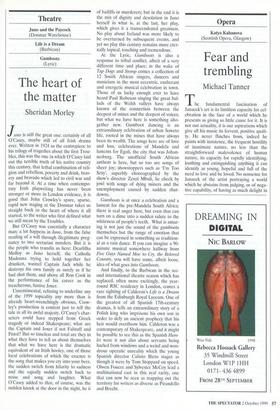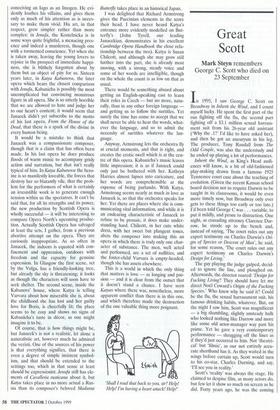Opera
Katya Kabanova (Scottish Opera, Glasgow)
Fear and trembling
Michael Tanner
The fundamental fascination of Janacek's art is its limitless capacity for cel- ebration in the face of a world which he presents as giving so little cause for it. It is not our actuality, it is our aspirations which give all his music its fervent, positive quali- ty. He never flinches from, indeed he paints with insistence, the frequent hostility of inanimate nature, no less than the straightforward malevolence of human nature, its capacity for rapidly identifying, loathing and extinguishing anything it can identify as young, hopeful and full of the need to love and be loved. No nonsense for Janacek of the artist portraying a world which he abstains from judging, or of nega- tive capability, of having as much delight in
conceiving an lago as an Imogen. He evi- dently loathes his villains, and gives them only as much of his attention as is neces- sary to make them vivid. His art, in that respect, grew simpler rather than more complex: in Jenufa, the Kostelnicka is in some ways quite frightful, a menacing pres- ence and indeed a murderess, though one with a tormented conscience. Yet when she is taken away, leaving the young lovers to rejoice in the prospect of immediate happi- ness, she is blithely forgotten about by them but an object of pity for us. Sixteen years later, in Katya Kabanova, the later opera which bears the closest comparison with Jenufa, Kabanicha is possibly the most uncomplicated but convincing monstrous figure in all opera. She is so utterly horrible that we are allowed to hate and judge her to our heart's content; it would seem that Janacek didn't yet subscribe to the motto of his last opera, From the House of the Dead, that there is a spark of the divine in every human being.
It would be a mistake to think that Janacek was a compassionate composer, though that is a claim that has often been made. In his last opera he does produce floods of warm music to accompany grisly action and narration, but that isn't really typical of him. In Katya Kabanova the hero- ine is so manifestly loveable, the forces that destroy her so blatantly vile, that the prob- lem for the performers of what is certainly an irresistible work is to generate enough tension within us the spectators. It can't be said that, for all its strengths and its power, the new production by Scottish Opera is wholly successful — it will be interesting to compare Opera North's upcoming produc- tion. Actually Scottish Opera has salvaged at least the sets, I gather, from a previous abortive attempt on the opera. They are curiously inappropriate. As so often in Janacek, the indoors is equated with con- finement and oppression, outdoors with freedom and the capacity for genuine expression. In Glasgow the first scene, set by the Volga, has a friendly-looking tree, but already the sky is threatening; it looks as though the characters will soon have to seek shelter. The second scene, inside the Kabanovs' house, where Katya is telling Varvara about how miserable she is, about the childhood she has lost and her guilty love for Boris, is cheerfully lit; the place seems to be cosy and shows no signs of Kabanicha's taste in decor, as one might imagine it to be, Of course, that is how things might be, but Janacek's is not a realistic, let alone a naturalistic art, however much he admired the veristi. One of the sources of his power is that everything signifies, that there is even a degree of simple insistent symbol- ism, and that should be extended to the settings too, which in that sense at least should be expressionist. Jenufa still has ele- ments of Cavalleria rusticana about it, but Katya takes place in no more actual a Rus- sia than its composer's beloved Madama Butte,* takes place in an historical Japan.
I was delighted that Richard Armstrong gives the Puccinian elements in the score their head. I have never heard Katya's entrance more evidently modelled on But- terfly's (John Tyrell, our leading Janacekian, demonstrates in his excellent Cambridge Opera Handbook the close rela- tionship between the two). Katya is Susan Chilcott, and although she may grow still further into the part, she is already most moving, with a strong, steady voice and some of her words are intelligible, though on the whole the count is as low on that as usual.
There would be something absurd about getting an English-speaking cast to learn their roles in Czech — but no more, natu- rally, than in any other foreign language — and getting us to follow the surtitles. Yet surely the time has come to accept that we shall never be able to hear the words, what- ever the language, and so to admit the necessity of surtitles whatever the lan- guage.
Anyway, Armstrong lets the orchestra fly at crucial moments, and that is right, and creates the erotic swell which is at the cen- tre of this opera. ICabanicha's music leaves little impression; it is as if Janacek could only just be bothered with her. Kathryn Harries almost lapses into caricature, and her words are comprehensible at the expense of being parlando. With Katya, Armstrong seems nearly as much in love as Janacek is, so that the orchestra speaks for her. Yet there are places where she is com- municating vital information, and while it is an endearing characteristic of Janacek to refuse to be prosaic, it does make under- standing hard. Chilcott, in her cute white dress, with her sweet but plangent tones, abets the composer into making this an opera in which there is truly only one char- acter of substance. The men, well acted and performed, are a set of nullities, and the foster-child Varvara is empty-headed, though she has assets elsewhere.
This is a world in which the only thing that matters is love — as longing and pas- sion — and it is clear from the outset that it doesn't stand a chance. I have seen ICatyas where there was, nonetheless, more apparent conflict than there is in this one, and which therefore made the destruction of the one valuable thing more poignant.
'Shall! read that back to you, sir? Help! Help! I'm having a heart attacks He p!'











































































 Previous page
Previous page